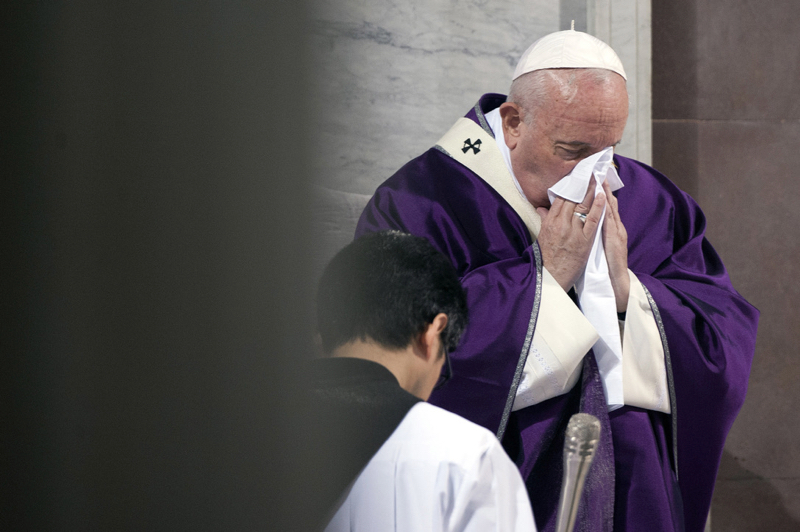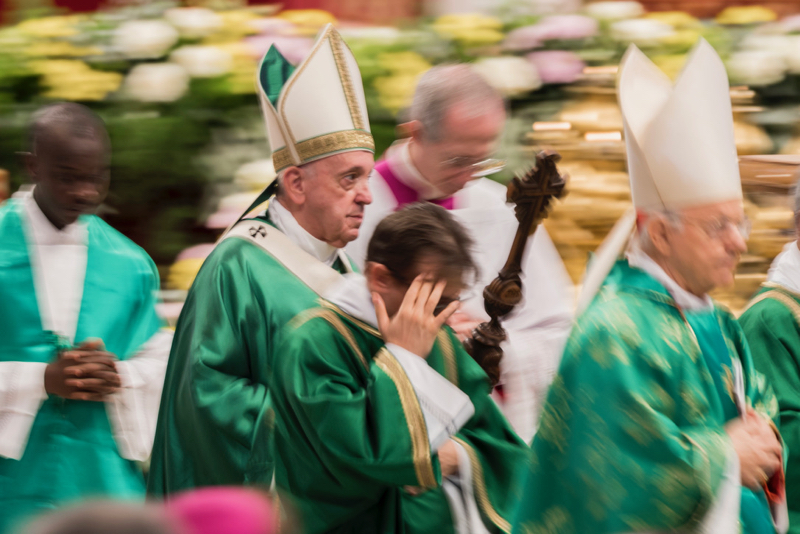Pope Francis was never going to fall into the trap set for him by his opponents over the Amazon synod. His response, contrary to the initial reaction, propels the Church on a path of ongoing reform. It’s just not in the way people expected.
After bishops from the region voted overwhelmingly in favour to ordained married men as priests in the Amazon, those intent on thwarting this pontificate kicked up such a fuss that any shift Francis made risked totally distracting from the central message of the synod: the Church’s work to protect the environment and to stand in solidarity with the Amazon's indigenous communities.
The 83-year-old Roman Pontiff was left in a bind. Faced with a pincer movement, the Pope appeared simply to ignore the contested questions around ordination in his text – on married men, and female deacons – and upheld the status quo.
But the story does not end there. The Pope’s response has opened doors rather than closing them and has laid the groundwork for future reforms. Francis did not say “no” to married priests in the document just “not at the moment".
In his post-synodal exhortation, Querida Amazonia, Francis made no explicit mention of the ordination of married men and only affirmed what “cannot be delegated” from the priesthood. He set the framework for discussions but did not silence any voice.
All the hot-button issues remain on the table, while a wider debate about how to devolve power away from a tiny group at the top of the Church hierarchy is very much under way.
Time, as the Pope is fond of pointing out, is greater than space. Look at any opinion poll, and you’ll find Catholics across the globe supportive of married priests and in giving more leadership positions to women. The momentum for change is like a flowing river, with a temporary dam the only thing holding back its progress. At some point the river will burst.
Francis knows this, and is building up the banks for the new river to run into. He’s done so by putting his faith in the local church, and in the case of the Amazon endorsing the final document voted on by the synod bishops. This is the game-changer.
In the synod’s final text 128 bishops voted to ordain married deacons as priests in remote regions while 137 in favour of continuing discussions on female deacons.
Crucially, it is the first time that a synod document has been given papal approval, and means the decision made by the Amazon synod fathers has its own authority. No one can scrub that from the record, and the Pope’s response must be read alongside document.
The acid test is how this plays out on the ground. Brazilian Cardinal Claudio Humes, a pivotal figure in the Amazon discussions, says the proposal for married priests will continue to be developed. Fr Antônio José de Almeida, an influential theologian in Brazil who was in Rome during the synod, goes further arguing that bishops are free to the Pope to ordain married men on a case-by-case basis. This pope, or a future one can allow married men to be ordained priests in the Amazon with the stroke of a pen.
Similarly, on the role of women, the Pope has pledged that the commission he set up in 2016 will continue while endorsing the bishops’ document which called for women to be admitted to lower level ministries and to make lay people leaders of local parish communities. Both are important shifts, moving the Church away from the clericalist models of the past, and to a more gospel-centred model envisioned by the Second Vatican Council.
When reading the Amazon document, it is worth recalling the reaction to the Pope’s other hotly anticipated document during his pontificate on family life. When Amoris Laetitia was released the responses focussed on how the Pope had struggled to push through a reform on allowing remarried divorcees to receive communion. The only explicit reference to the issue was buried in a footnote.
But on the Amazon and family life, Francis moved to enact a more profound shift: giving authority to local Churches, and frame the disputed questions within the context of pastoral need, rather than ideological battles. Since its release in 2016, Amoris Laetitia has become the blueprint for a renewed family ministry built around compassion, discernment and pastoral accompaniment. And yes, a majority of bishops’ conferences in implementing Amoris Laetitia allow for remarried divorcees to receive communion.
The Pope writes in his family document that “not all discussions of doctrinal, moral or pastoral issues need to be settled by interventions of the magisterium,” The Amazon synod, with its unprecedented listening exercise involving 87,000 people, is the next step on this journey. In Querida Amazonia Francis points that the synod report voted on by the bishops will stand in its own right as comes from those “who know better than I and the Roman curia the problems and issues of the Amazon region”.
The Jesuit Pope is shrewd enough to know how easily reforms can be crushed in Rome. For that reason, he did not want the Amazon synod to become a referendum on married priests, or a self-referential discussion framed from the Church’s centre.
As the synod concluded, Francis argued the Church’s diagnosis of the problems in the Amazon could not be reduced to a discussion on “intra-ecclesiastic discipline” which a certain “elite group of Christians” was focussing on. Catholics unable to see the bigger picture, he said quoting the French philosopher Charles Peguy, “think that they love God” but only “because they love no one else.”
It was an indication that he would do everything possible to avoid reaction to his post-synodal text to become questions of ordination, rather than the threats to the world’s major source of oxygen.
Throughout his pontificate, Francis has made protection of the planet a pressing moral, theological imperative, from calling for action to tackle climate change on the front lawn of the White House in 2015 to his encyclical on the environment, Laudato si’.
Time is not on the world’s side. Just last week a leaked internal report for JP Morgan, the world’s biggest investor in fossil fuels, wrote that climate change could cause “catastrophic outcomes where human life as we know it is threatened.” The report for the US bank calls for carbon emissions to be cut to prevent wars, food shortages and huge numbers of people forced to flee their homes.
As the synod began, Francis told participants they had not been asked to create development programmes or “non-contemplative” pastoral initiatives “respect the poetry” of the Amazon.
It is poetry, Francis writes in Querida Amazonia, that makes the suffering cry of the Amazon understood and he quoted the Colombian poet Juan Carlos Galeano: “the river is a cord enclosing animals and trees. If pulled too tight, the river could burst.”
The Pope’s studied ambiguity on disputed Church topics, and his refusal to be drawn into “either-or” debates is a hallmark of his ministry. Some criticise him for a lack of clarity and want to force him into “either - or” decisions. Francis refuses. Here, it is worth recalling the traps set for Jesus by the religious authorities of the time. When questioned about tax, or keeping commandments Jesus who did not give “yes or no” answers, but wrong-footed his opponents by offering counter-intuitive responses built on the mosaic laws and tradition. The law came to be fulfilled, not to be revoked, and cannot be reduced a single issue.
By generating a spirit of ongoing discernment, and opening up reform processes Francis is utilising the tools of Catholic tradition as he lays the ground work for a new way of being the Church.



 Loading ...
Loading ...